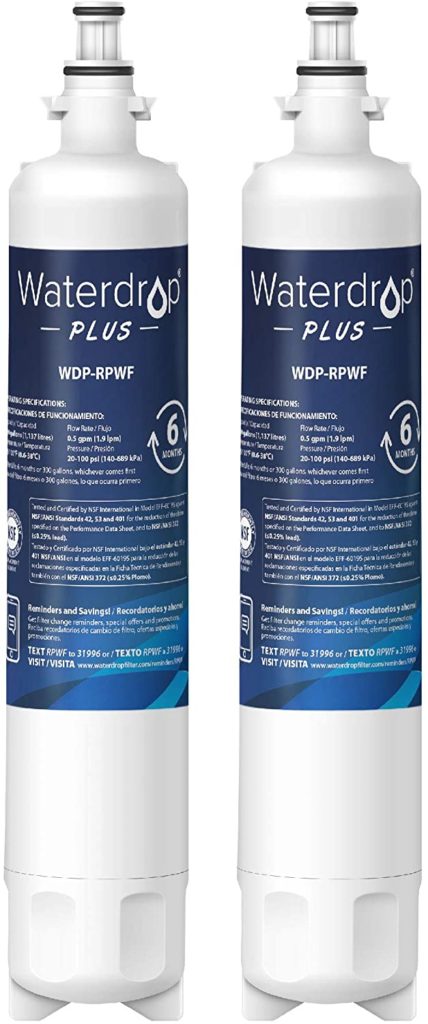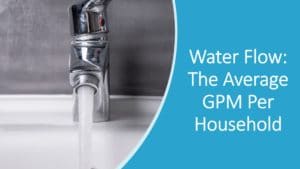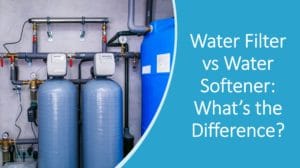Water filters remove contaminants from your water, whether you’re using tap water or well water. Contaminants in tap water may include fluoxetine, progesterone, and even ibuprofen. Well water is often contaminated by lead, pesticides, and other chemicals that seep into the ground and get into the water.
Regardless of what type of water you use, both RPWF and RPWFE filters have multi-stage filtration systems that will eliminate toxins and purify your water. Both styles come with almost the same fundamental features and get installed in your refrigerator water system. However, there is a difference between RPWF and RPWFE filters.
What is the difference between rpwf vs rpwfe? The difference is that Older refrigerators use the RPWF filters, whereas newer models come equipped with RPWFE filters.
RPWF vs RPWFE: How Are They Different?
There are many differences when you look at RPWF vs. RPWFE water filters. RPWFE filters are a step up from the RPWF versions, but not all of the upgrades have to do with filtration quality. RPWFE filters have a radio frequency identification (RFID) chip that allows them to communicate with your refrigerator.
Though it is recommended that you change any water filter every six months for the best quality of water, the RFID chip can tell you how much longer is left in the filter’s life. The chip can also tell you if there is a leak within your refrigeration system, helping cut down on possible damage and necessary repairs.
The RFID chip is the reason that RPWF filters are no longer compatible with newer refrigerators. Though older General Electric refrigerators can use the RPWFE filters, they don’t have a touch screen or any other sensors to read the RFID chip. There is no advantage to using RPWFE filters in an older model.
Because the RPWFE filters are more expensive than the RPWF filters, some customers have tried to figure out how they can improve the older filters to work with the newer fridge. The key is the RFID chip, which newer refrigerators must read to filter and dispense water. There is a bypass cartridge included with all refrigerators, so you can still use the water dispensers even when you don’t have a filter, but this water comes through unfiltered.
If you are reluctant to buy expensive RPWFE filters and don’t want to use the bypass cartridge and drink unfiltered water, there is a way to hack RPWF filters. Customers have found that they can remove the RFID chip from where it is stuck to the back of the RPWFE filters. This is the part of the filter that must be installed touching the fridge so the sensor can read the card.
If you carefully peel back the label, you will see the RFID chip. Make sure you note how it is placed on the RPWFE filter to install it on the other filters correctly. You can also attach the chip directly to the sensor on the fridge, so you only have to do it once, instead of applying it to a new RPWF filter every six months.
RPWFE vs RPWF: How Are They Similar?
When considering RPWF vs. RPWFE, it’s essential to know that they have some common qualities. Both filter your refrigerator water systems very effectively. They have been approved and verified to adhere to the NSF/ANSI safety standards for drinking water.
Both filters last for six months or filter about three hundred gallons of water, whichever comes first. RPWF and RPWFE filters come in multipacks allowing you to purchase several at once and avoid buying repeatedly. They are also fairly easy to install on your own.
What is RPWF?

General Electric uses the RPWF water filtration system in their side-by-side and bottom freeze models of refrigerators. These filters use carbon block technology to filter out contaminants such as dirt, sand, lead, chlorine, and more. This system effectively filters over 97% of harmful toxins from your drinking water.
Once the RPWFE filters were introduced, General Electric decreased production on RPWF filters. There are knock-offs available to buy, but if you want to stick with General Electric’s name brand products, you’ll have to purchase their improved RPWFE filters.
What is RPWFE?

RPWFE filters were released in 2017. With more pharmaceuticals being released into water sources, filters were upgraded to eliminate those toxins. Volatile organic compounds (VOCs) are caused by chemicals commonly used in homes and factories, and RPWFE filters have been enhanced to extract over 99% of these from the water.
With all of these improvements, it’s no surprise that RPWFE water filters cost more than RPWF ones. If you have a newer refrigerator model, you will have to use RPWFE filters because other kinds are not compatible. However, if you have an older refrigerator, you don’t have to buy a whole new appliance just to get the benefits of an RPWFE filter; these filters can be retrofitted to older models.
You will need to weigh the cost and the benefits, though. If you have a decent water supply, you might not want to pay more for the advanced RPWFE filtration.
The Bottom Line
Don’t just look at the price and buy the cheaper RPWF filters without knowing what you’re getting. You must have an RPWFE filter for newer refrigerators with a touch screen and other technology. RPWF filters will not work with these updated systems, and you will have wasted money. You also do not want to keep using the same RPWFE filter to save money. In the long run, it will become clogged up and eventually stop filtering your water altogether.
If you have an existing RPWFE filter, you can stick the RFID chip to the RPWF filters so your existing filter can work as an RPWFE one. Apart from this “hack,” your only alternative is to continue purchasing RPWFE filters to get the most out of your refrigerator water filtration system.
Related:





